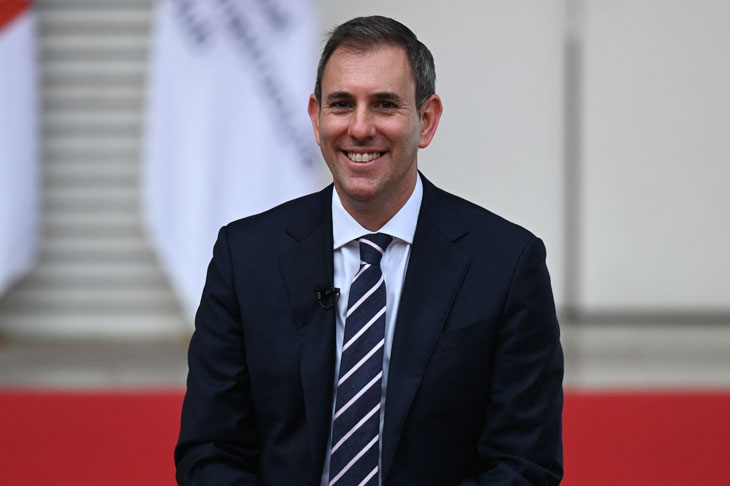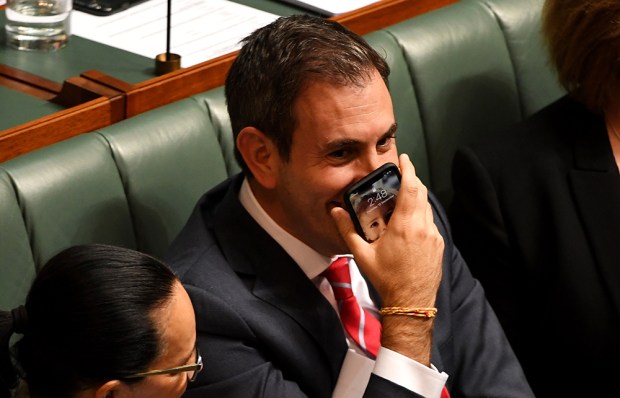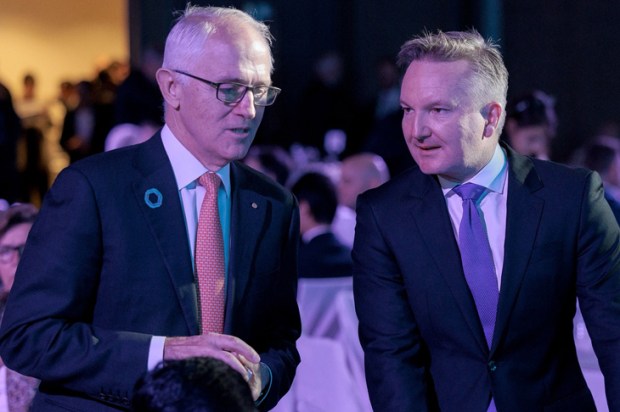You have to wonder why Jim Chalmers, our current federal Treasurer – Jimbo to Speccie readers – bothered to stay home for the week leading up to the Voice referendum. He could have been rubbing shoulders with the world’s top finance ministers at two overseas events.
But he chose to fight it out in Queensland, of all places. Recall here that Queensland voted a resounding No to the referendum question, along with the good burghers of Rankin, Jimbo’s seat.
Should we interpret this as an act of loyalty to chief Voice promoter, Albo, demonstrating his enthusiasm for the cause even when everyone knew it was lost? Or perhaps he stayed at home to make a point of comparison with his leader?
Currently, Jimbo is tying himself in knots about the economic challenges facing the country as he attempts to duck and weave around the big issues while patting himself on the back for the clever measures he has implemented and the government’s spending restraint.
He is clearly sweating on what the Reserve Bank under its new leader, Michele Bullock, will do about interest rates. He goes to great lengths to emphasise the independence of the bank while saying all sorts of things designed to fend off any further increases in the cash rate.
He even quoted her descriptions of the government’s fiscal policy as a complement to monetary policy as ‘good’ and ‘enough’. This looked like desperation on Jimbo’s part. Let’s face it, Bullock wants to suck up to the government at this point but those two adjectives were hardly effusive.
When the September quarter CPI figures were released, Jimbo was immediately on the case, claiming that they didn’t represent a ‘material change’ notwithstanding the fact that the latest headline figure was significantly higher than anticipated. Was he trying to influence the bank’s decision-making while saying he obviously respects the independence of the bank?
Jimbo was also put out by the IMF’s latest report on the Australian economy in which further increases in interest rates were recommended in order to achieve inflation within the 2 to 3 per cent annual band by 2025. According to the IMF, the rate of inflation remained ‘too high’ and the rising cost of services looks ‘sticky’.
But Jimbo could see only positives in the IMF report. He claimed that the IMF ‘backed the Albanese government’s responsible budget management and highlight our targeted policies to address cost-of-living pressures’. Did it? Did it, really?
(Just to be clear on these IMF and OECD country reports, they are not fully independent, with Treasury officers both here and overseas having considerable input into the final drafts. The IMF’s mission chief, for instance, would have been intensively briefed by Treasury officials here and back in Washington.)
There is no doubt that both Jimbo and Albo are increasingly concerned about the political fallout of ongoing cost-of-living pressures. It’s why they both rattle off the list of initiatives already taken, including: electricity rebates, childcare subsides, cheaper medicine and higher GP rebates for bulk-billing.
The key problem is these additional subsidies are just government spending and, as such, are stimulatory and work to make the prospect of higher interest rates more likely. It’s why Jimbo – and Albo – talk about these measures as ‘investment’ rather than ‘spending’, a trick that Jimbo learned from his old boss, former treasurer, Wayne Swan.
Mind you, the trick didn’t work then and won’t now. Just think about: if the government could reduce the observed rate of inflation by implementing an even bigger raft of subsidies, we wouldn’t have an inflation problem at all. Or would we?
The additional spending would force the arm of the Reserve Bank to significantly increase cash rates, thereby adding to many people’s cost-of-living problems. And the government would find it necessary to further ramp up the subsidies as an insidious inflationary cycle took hold. There are no magic puddings in the dismal science of economics, thankfully.
Jimbo made a very strange speech at the recent 2023 Economic and Social Outlook Conference held in Melbourne on 2 November. His keynote presentation focused on climate policy and related industry policy, both portfolio areas led by other ministers.
Was he telling us that he’s really in charge here? Was he saying that he’s the senior economic minister and all economic issues must be endorsed by him? While speaking highly of Bowen, Husic, Plibbers and King, was he really damning their performances with faint praise? Why was he telling us ‘the energy transition could fall short of what the country needs’?
To this end, Jimbo declared that he was going to get serious and avert this ‘disaster’. He noted that ‘complex, cumbersome regulation continues to cut across our Federation, creating bottlenecks for clean energy projects. That’s why we’ve got a detailed policy agenda to address these barriers and get more projects off the ground’. In other words, heavy-handed intervention is his preferred approach as well as throwing even more government money at green stuff in the next budget.
But Jimbo still seems to be very confused on the topic. While claiming that ‘the net-zero transformation will be the defining piece of the defining century’, he should realise that there is a difference between Australia achieving net zero and Australia becoming an ‘energy superpower’ – an already overused cliché.
The reality is that the scope for Australia to refine and process critical minerals and to manufacture generating equipment, batteries and green metals is very limited. Sure, we have deposits of most of the minerals but so do plenty of other countries. The combination of onerous and lengthy environmental approval processes, arcane industrial relations arrangements and high energy costs means that we have Buckley’s chance of becoming an ‘energy superpower’.
And here’s something that Jimbo should know: processing and manufacturing are very emissions-intensive, which is why they occur in countries that don’t really give a toss about emissions.
Jimbo’s speech did confirm my prediction that the Albanese government would flick the switch to the energy transition after the referendum defeat. I’m not sure why, given the growing local opposition to the roll-out of large-scale renewable energy projects and new transmission lines, including in some Labor seats.
Is this really a political winner, particularly given recent polling that points to a rising proportion of voters who think we are doing enough to address climate change and the significant slump in the proportion who think we’re not doing enough?
It’s a tricky time ahead for Jimbo as the pilot light of purpose, his self-declared driving force, flickers.
Got something to add? Join the discussion and comment below.
Get 10 issues for just $10
Subscribe to The Spectator Australia today for the next 10 magazine issues, plus full online access, for just $10.
You might disagree with half of it, but you’ll enjoy reading all of it. Try your first month for free, then just $2 a week for the remainder of your first year.














Comments
Don't miss out
Join the conversation with other Spectator Australia readers. Subscribe to leave a comment.
SUBSCRIBEAlready a subscriber? Log in